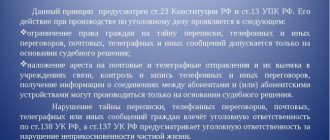1. Violation of the confidentiality of correspondence, telephone conversations, postal, telegraph or other messages of citizens -
shall be punishable by a fine in the amount of up to eighty thousand rubles, or in the amount of the wages or other income of the convicted person for a period of up to six months, or by compulsory labor for a term of up to three hundred sixty hours, or by corrective labor for a term of up to one year.
2. The same act committed by a person using his official position, -
shall be punishable by a fine in the amount of one hundred thousand to three hundred thousand rubles, or in the amount of the wages or other income of the convicted person for a period of one to two years, or by deprivation of the right to hold certain positions or engage in certain activities for a period of two to five years, or by compulsory labor. for a term of up to four hundred eighty hours, or forced labor for a term of up to four years, or arrest for a term of up to four months, or imprisonment for a term of up to four years.
3. Lost power. — Federal Law of December 7, 2011 N 420-FZ.
- Article 137. Violation of privacy
- Article 138.1. Illegal trafficking of special technical means intended for secretly obtaining information
Commentary to Art. 138 of the Criminal Code of the Russian Federation
The object of this criminal attack is social relations arising in connection with the exercise of the right to privacy of correspondence, telephone conversations, postal, telegraph or other messages. The specified rights in accordance with Part 2 of Art. 23 of the Constitution of the Russian Federation can be limited only on the basis of a court decision.
The subject of the crime in question is postal or telegraph correspondence, telephone conversations, postal, telegraph and other messages. To qualify a crime, the medium of information and its content do not matter.
The direct object of the crime provided for in Part 3 of Art. 138 of the Criminal Code of the Russian Federation, is the procedure established by law and other regulatory legal acts for the production, acquisition, and sale of special technical means intended for secretly obtaining information.
The objective side of the crime is expressed in an active form of behavior and consists of performing any illegal actions that violate the secrecy of correspondence, telephone conversations, postal, telegraph or other messages of citizens (parts 1, 2 of Article 138 of the Criminal Code of the Russian Federation), as well as alternative actions in the form of illegal production, sale or acquisition for the purpose of sale of special technical means intended for secretly obtaining information (Part 3 of Article 138 of the Criminal Code of the Russian Federation).
Illegality of actions means their commission, gaining access to the contents of correspondence, telephone conversations, etc. under conditions not specified by law. Therefore, it cannot be considered a violation of the secrecy of telephone conversations if they were intercepted with the permission of a judge on the basis and conditions established by Federal Law of August 12, 1995 N 144-FZ “On Operational-Investigative Activities”.
———————————
NW RF. 1995. N 33. Art. 3349.
The Constitution of the Russian Federation, guaranteeing everyone the right to privacy, secrecy of correspondence, telephone conversations, postal, telegraph and other messages, allows for the possibility of limiting this right only on the basis of a court decision (Article 23), which is specified, in particular, in Part 2 Art. 8 of the Federal Law “On Operational-Investigative Activities”, according to which the conduct of operational-investigative activities that limit the constitutional rights of a person and a citizen to the secrecy of correspondence, telephone conversations, postal, telegraph and other messages transmitted over electrical and postal communication networks is allowed on on the basis of a court decision and if there is information: about the signs of an unlawful act being prepared, committed or committed, for which a preliminary investigation is mandatory; about persons preparing, committing or having committed an unlawful act for which a preliminary investigation is mandatory; about events or actions (inaction) that create a threat to the state, military, economic or environmental security of the Russian Federation.
———————————
See: Determination of the Constitutional Court of the Russian Federation of March 20, 2007 N 178-О-О // Constitutional justice in the CIS and Baltic countries. 2007. N 13.
Special technical means intended for secretly obtaining information act as the subject of a criminal attack (Part 3 of Article 138 of the Criminal Code of the Russian Federation), as well as a means of committing the crime in question (Part 2 of Article 138 of the Criminal Code of the Russian Federation).
Special technical means intended for secretly obtaining information are understood as equipment, technical equipment and (or) tools designed, adapted or programmed for secretly receiving and recording acoustic information; listening to telephone conversations; interception and recording of information from technical communication channels; control of mail messages and items; research of objects and documents; receiving (changing, destroying) information from technical means of its storage, processing and transmission.
———————————
See: Decree of the Government of the Russian Federation of July 1, 1996 N 770 // SZ RF. 1996. N 28. Art. 3382.
Such means include, for example, special technical means for covertly receiving and recording acoustic information, for covert visual observation and documentation, for covert wiretapping of telephone conversations, for covert interception and registration of information from technical communication channels, for covert control of postal messages and shipments, for covert examination of objects and documents, for covert entry and inspection of premises, vehicles and other objects, and others.
The illegality of performing the actions specified in the disposition of Part 3 of Art. 138 of the Criminal Code of the Russian Federation means their commission in violation of the established procedure.
So, for example, Art. 17 of the Federal Law of August 8, 2001 N 128-FZ “On licensing of certain types of activities” establishes a requirement for licensing activities for the development, production, sale and acquisition for the purpose of selling special technical means intended for secretly obtaining information by individual entrepreneurs and legal entities carrying out business activities. In development of the provisions of the Law, Resolution of the Government of the Russian Federation of July 15, 2002 N 526 was adopted “On approval of the Regulations on licensing activities for the development, production, sale and acquisition for the purpose of selling special technical means intended for secretly obtaining information by individual entrepreneurs and legal entities, carrying out entrepreneurial activities."
———————————
NW RF. 2001. N 33 (part I). Art. 3430.
NW RF. 2002. N 29. Art. 2965.
Resolution of the Government of the Russian Federation dated March 10, 2000 N 214 approved the Regulations on the import of these funds and their export from the Russian Federation.
———————————
NW RF. 2000. N 12. Art. 1292.
The objective side of the crime under Part 3 of Art. 138 of the Criminal Code of the Russian Federation, constitutes the commission of actions specified in the law in violation of the above and other regulatory legal acts. If there are appropriate signs, the act in question can be classified as a set of crimes provided for in Part 2 of Art. 138 of the Criminal Code of the Russian Federation - committing an act with technical means intended for secretly obtaining information.
The production of these technical means should be understood as their industrial or handicraft production, adaptation of household equipment for special purposes, its modernization for secretly obtaining information, etc. Sales involve the transfer of an item to another person (at least one), exchange, donation, etc. Any form of taking possession of them can be considered an acquisition. If the method of taking possession of an object contains signs of an independent crime (for example, theft), the act should be classified according to the totality of the crimes.
Familiarization with the contents of correspondence or telephone conversations with the consent of one of the subscribers, although it violates the indicated constitutional rights of the other, does not constitute the crime under consideration.
The elements of the crime in question are formal. The crime is completed from the moment of committing an act that violates the specified secret, or performing actions for the production, sale or acquisition for the purpose of sale of special technical means intended for secretly obtaining information.
When deciding whether there is a violation of the secrecy of correspondence, telephone conversations and other communications of citizens, it is necessary to base it on all the circumstances of the case: relations with the victim, motivation for behavior, frequency of violations, method of committing the act, etc. This is necessary in order to distinguish between a criminal act and a minor act. So, for example, an act in which a neighbor, out of curiosity, pulled a letter out of the mailbox and, after reading it, returned it to its place, can hardly be recognized as a crime. The act was committed only once. Formally, in this situation the corpus delicti exists. However, the absence of socially dangerous consequences, the only fact of such an action give grounds for the conclusion that there is no corpus delicti due to the insignificance of the act.
The subjective side of the crime is characterized by guilt in the form of direct intent. The person is aware that he is taking actions aimed at violating the confidentiality of correspondence, telephone conversations, postal, telegraph or other messages, and wishes to carry them out. In a qualified composition (Part 2 of Article 138 of the Criminal Code of the Russian Federation), the person, in addition, is aware that he uses special technical means intended for secretly obtaining information to familiarize himself with the contents of correspondence, telephone conversations or postal, telegraph or other messages act with their use. The motive for the crime does not affect the qualification of the act. They may be curiosity, self-interest, envy, etc.
When performing an act prohibited by Part 3 of the article in question, a person is aware that he is illegally producing, selling or acquiring for the purpose of selling special technical means intended for secretly obtaining information, and wants to perform these actions.
The acquisition of these technical means constitutes a crime only if there is a purpose for their sale, which must be pursued by the buyer already at the time of purchase of the goods.
In the main compositions (parts 1, 3 of Article 138 of the Criminal Code of the Russian Federation) the subject of the crime is a common one. He is a sane person who has reached the age of sixteen. In a qualified composition (Part 2 of Article 138 of the Criminal Code of the Russian Federation) a special subject. He is a person using his official position (see commentary to Article 136 of the Criminal Code of the Russian Federation).
These can be both “ordinary” employees (postman, radio operator, telegraph operator), and officials who, due to the performance of their official duties, provide communication services, have access to communication hardware, their maintenance or repair, transportation or delivery of correspondence, etc. .
The actions of officials can be qualified in combination with official crimes if there are elements of these crimes.
In cases where there is a violation of the confidentiality of correspondence, etc. is a way of violating privacy, as noted above, the act should be qualified under Art. 137 of the Criminal Code of the Russian Federation.
Article 138. Limitation on the amount of deductions from wages
Determination of the Constitutional Court of the Russian Federation dated February 27, 2020 N 318-O, part two of Article 107 “Deductions from wages and other income of persons sentenced to imprisonment” of the Penal Code of the Russian Federation, which, in its opinion, implies - contrary to the requirement of Article 138 of the Labor Code of the Russian Federation about the fact that the amount of deductions from wages to compensate for damage caused by a crime cannot exceed 70 percent - the possibility of deducting more than 70 percent of his wages to reimburse the costs of maintaining a convicted person;
Determination of the Constitutional Court of the Russian Federation dated May 28, 2020 N 1334-O
FEDERATION, ARTICLES 129 AND 138 OF THE LABOR CODE OF THE RUSSIAN FEDERATION, the Constitutional Court of the Russian Federation composed of Chairman V.D. Zorkin, judges K.V. Aranovsky, A.I. Boytsova, N.S. Bondar, G.A. Gadzhieva, Yu.M. Danilova, S.M. Kazantseva, L.O. Krasavchikova, S.P. Mavrina, N.V. Melnikova, Yu.D. Rudkina, V.G. Yaroslavtseva,
Resolution of the Supreme Court of the Russian Federation dated September 1, 2017 N 53-AD17-3
Moreover, by virtue of part one of Article 138 of the Labor Code of the Russian Federation, the total amount of all deductions for each payment of wages cannot exceed 20 percent, and in cases provided for by federal laws - 50 percent of wages due to the employee.
Ruling of the Supreme Court of the Russian Federation dated September 5, 2018 N 306-KG18-12824 in case N A12-43593/2017
When considering the dispute, the courts were guided by Articles 213.9, 213.25 of the Federal Law of October 26, 2002 N 127-FZ “On Insolvency (Bankruptcy)”, Article 138 of the Labor Code of the Russian Federation and proceeded from the fact that the complained of inaction does not comply with the requirements of the Bankruptcy Law and violates the rights and legitimate interests of interested parties.
Ruling of the Supreme Court of the Russian Federation dated September 16, 2021 N 305-ES17-2344(51) in case N A40-232020/2015
At the same time, the applicant did not disclose information about how many accounts and in what amount he receives wages and other income. Referring in the complaint to the unlawful seizure of 80% of wages and other income in the bank accounts of D.V. Ozerov. (Article 138 of the Labor Code of the Russian Federation), he provides information about wages on one of them, without disclosing information in relation to other accounts, which did not allow the courts to objectively, based on the entire set of data on income, determine the level of income that is necessary for normal existence of the defendant, based at the same time on the provisions of Article 99 of the Federal Law of October 2, 2007 N 229-FZ “On Enforcement Proceedings”, Article 446 of the Civil Procedure Code of the Russian Federation, as well as the balance of interests of himself and the creditors in whose interests a lawsuit was filed to attract D.V. Ozerov. to subsidiary liability.
Determination of the Constitutional Court of the Russian Federation dated May 28, 2009 N 637-О-О
Since convicts who are not working for reasons beyond their control are provided with food and basic necessities at the expense of the state (part three of Article 99 of the Penal Code of the Russian Federation), and convicts receiving wages are reimbursed for the cost of food, clothing, utilities and personal hygiene products (part four of the same article), the applicant concludes that part four of article 99 of the Penal Code of the Russian Federation is discriminatory in relation to working convicts. In addition, S.E. Matveev points out that, by virtue of Article 138 of the Labor Code of the Russian Federation, the total amount of all deductions for each payment of wages cannot exceed 20 percent, and in cases provided for by federal laws - 50 percent of wages due to the employee; the norm of part three of Article 107 of the Penal Code of the Russian Federation, replacing, in the applicant’s opinion, the said norm of labor legislation, allows for the withholding of a significantly larger part of the convict’s wages. S.E. Matveev believes that the contested provisions of Articles 99 and 107 of the Penal Code of the Russian Federation violate his rights guaranteed by Articles 2, 10, 15, 17 - 19, 37 and 55 of the Constitution of the Russian Federation.
Download Bank of Russia instruction 138 dated 06/04/2012
As can be seen from the above material, the changes affected many aspects related to banking operations and document flow. To fully familiarize yourself with the original Bank of Russia instruction No. 138 dated June 4, 2012, as well as its annexes, we suggest downloading it directly from our website.
Related articles:
- List of the most reliable banks in Russia in 2012
- Bad credit history: what to do and how to fix your credit history
- Teacher mortgage in Russia in 2012
- How to save money from inflation and increase it: the most effective ways in 2012
- Futures and options in Russia. Hedging with futures contracts
- How to get a bank loan: 3 proven methods
- Which bank is more profitable to place a Russian deposit in 2012?





